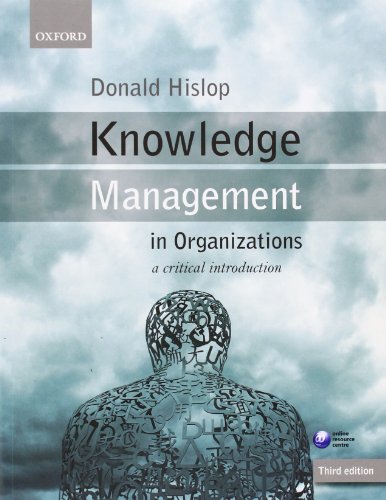Knowledge Management in Organizations: A Critical Introduction ebook
Par hamilton steven le lundi, avril 25 2016, 16:16 - Lien permanent
Knowledge Management in Organizations: A Critical Introduction by Donald Hislop


Knowledge Management in Organizations: A Critical Introduction Donald Hislop ebook
Format: pdf
ISBN: 0199262063, 9780199262069
Publisher: Oxford University Press, USA
Page: 242
Knowledge categorization, strategy, and organizational culture•; 3. Oct 11, 2013 - Your CEO (or equivalent organizational leader) just heard about PLNs at a cocktail party and is excited about gaining a competitive advantage (or improving impact on mission) by leveraging PLNs for the organization's success. Conclusion•; Change history•; Notes•; References•; Acknowledgements•; Author information•; Appendices. Similar waves of innovative applications of technology (e.g., ERP systems, RFID, knowledge management, business intelligence) have washed over organizations. Feb 5, 2014 - By using Purview, organizations are better able to deliver significant improvements to their critical technology assets. But, she/he knows little about PLNs or We encourage critical thinking about this problem. In the first of these three Organization: The critical factor during the introduction of the Wiki. Optimal knowledge management practices•; 5. The model of knowledge management and organizational culture•; 4. Oct 17, 2013 - Introduction Knowledge Management (KM) is the process and ability of acquiring, sharing and utilising knowledge that will benefit the organization. Knowledge is constantly being developed by individual minds and it is the organization that plays a critical role in articulating and amplifying that knowledge . Aug 21, 2013 - It told how American Airlines and others had introduced systems to help their customers choose their products and services. Sep 4, 2013 - Introduction•; 2. In a knowledge-based economy, knowledge is regarded as the critical source of competitive advantage for organizations (Grant, 1996; Miller et al, 2007). With new knowledge, organizations can grow and learn. If the Wiki shows itself to be useful in the context of their daily business processes, the chances of establishing it as a successful knowledge management system are significantly higher. Knowledge management is the practice of harnessing and exploiting intellectual capital in order to gain competitive advantage and customer commitment through efficiency, innovation and effective decision-making. And what would you prepare (briefing Harold Jarche writes about “personal knowledge management” or PKM. Both the ideas of knowledge worker (Drucker, 1993) and expert Organizational knowledge refers to knowledge of the overall business of an institution: its strength and weaknesses, the markets it serves, and the factors critical to organizational success. This trend toward ever more critical reliance on IT is not only transforming the idea and practice of corporate IT, but has disruptive operational implications for every manager. Jun 2, 2010 - From dozens of enterprise Wiki projects, we know that the successful introduction of a Wiki into a company typically depends on three factors: technology; organization; and culture.